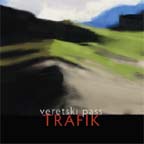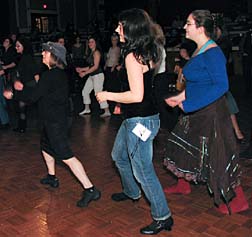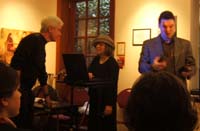Okay. By now you'll have gathered that I am infatuated with Shtreiml. I contend that it is with good reason. Listen to their CDs and read the concert review that follows and decide for yourselves. And, for now, no more features about them for a little while. Even though, a week later, I can still see Lemisch's trombone and hear Arsenault's incredible drumming and all the rest....
On a lucky break, I discovered that there was going to be a Shtreiml concert last Saturday night down in Portsmouth, RI. As folks who caught my write-up of the band's appearance with Golem and SoCalled last year will know, I find their performances quite exciting. The only thing better, perhaps, than their CDs. This particular set was sponsored by an organization called "Common Fence," which sponsors a whole series of excellent folkies/blues/traditional music groups ranging from (looking at what's on tap over the next few months) the blues of Roy Bookbinder to the excellent folk of Patty Larkin and Catie Curtis. The events take place is a lovely meeting hall seeming out in the middle of nowhere to a Boston driving trying to find the place at the last minute, just off the highway in the dark.
From the band's opening klezmer funk riffs, right into the first tradeoff leads between Winograd (clarinet) and Rosenblatt (mostly diatonic harmonica; occasional keyboard) the band burned the house down bouncing back and forth between traditional klezmer and some new prog-rock influenced jam band fusion. In the middle of the 2nd or 3rd number, for instance, the band broke into an a capella nign for several minutes. Then Adam Stotland's bass picked up that prop rock riff and the band was back, burning, playing something else. The band is so tight, I sight tapping my feet, in awe. By the time they start the first set they are already in a groove that usually comes only later.
I sat mesmerized by drummer Thierry Arsenault's rhythms. Like Khevre alumnus Richie Barshay who now tours with the Klezmatics, Arsenault is a "klezmer native" in the sense that he not only gets klezmer drumming deeply, but also in the ways that he integrates that prog rock/jazz rock background with his current love of klezmer and balkan rhythms.
[Musing while listening to Rachel Lemisch, descended from a long line of Jewish musicians, hold forth—my two favorite young trombonists—her and Dan Blacksberg, are both from Philly.]
[More musing. If the first generation klezmer revivalists were somewhere between the Clancy Brothers and the Irish Rovers, trying to figure things out, trying to figure their audience out, Shtreiml represents what happens when musicians have grown up with this music and mixed it in with everything else that they love. This is one of the really hot hot young bands--maybe the one stretching the envelope the most. Listening tonight I am reminded a bit of the way my synapses exploded the second time I saw the Klezmatics, at a club in downtown San Francisco, and suddenly realized that we weren't looking for bands to figure out what Dave Tarras might have sounded like if he had started playing in the 1980s instead of almost a century earlier. Shtreiml are that good.]
What is most gratifying is the way that the audience, as friendly a group of folkies as ever crowded into Cambridge's Club Passim, or Berkeley's Freight and Salvage, are drinking in the music. This is not traditional klezmer at all. In fact, with guest guitarist Andrew Stern filling in for saz or oud on "Fenci's Blues,"—to the extend that fuzzy, heavily effected guitar substitutes for traditional Turkish instrumentation and playing—this is an entirely new dimension. If Shirim once made me think of what the Grateful Dead might have sounded like, had the Dead played klezmer; Shtreiml sounds suspiciously like Phish, had Phish had the sense and ability to use klezmer as one important component of their music.
Stern switches to banjo for a very jazzy, Americanized bit of traditional klezmer, and then the clarinet/harmonica intro to "Howard's Serba" carries us forward. Cognizant of the season, Jason breaks into "O Hanukka" during his solo. Winograd, in response, slips in a bit of "I have a little dreidl."
Opening the second set with some more traditional klezmer, Mercury writer Janine Wiesman leads a line of women dancing around the hall. Jason introduces a new number, "Serba a la Oscar," a name that seems sufficiently innocuous until he explains that it is named for the eponymous family pet rabbit, Oscar. They roll into their Bo Diddley-inflected cover of Shloimke Beckerman's "Galitzianer Tantz," a throwback to the days when Blues Traveler was a heavy influence.
I've seen Shtreiml at a hassidic wedding sneaking in Celtic music during the breaks; I've seen them play in entirely traditional mode at KlezKanada. But seeing them on stage in native mode, playing the music that comes out when they can play whatever matters most to them is best. Just a year after their last Boston-area gig their sound has changed to thoroughly, moving from strength to strength. I can only dream that enough people will hear them play, giving them the audience they deserve so that they can tour steadily, giving me the chance to hear them oftener than once a year.
 I am sitting here listening to my new favorite CD, the latest release by those hutsul-trafficking masters of traditional music, Josh Horowitz, Cookie Segelstein, and Stu Brotman: Veretski Pass. The official release claims:
I am sitting here listening to my new favorite CD, the latest release by those hutsul-trafficking masters of traditional music, Josh Horowitz, Cookie Segelstein, and Stu Brotman: Veretski Pass. The official release claims: Not all of us made it to KlezKamp this year. To get a sense of the what we missed (and to memorialize it for those who were there),
Not all of us made it to KlezKamp this year. To get a sense of the what we missed (and to memorialize it for those who were there), 
 Earlier in December, Judy and I were in town for the
Earlier in December, Judy and I were in town for the  Basya was accompanied by piano, cello, and violin. She introduced the pieces, sang, and played guitar. The music was a smooth blend of Middle Eastern, classical, and American folk/pop phrasings, creating a rhythmic artsong/cabararet feel. We were entranced. I hope that the series will be made available publicly. As did Jewlia Eisenberg on her Walter Benjamin recording (
Basya was accompanied by piano, cello, and violin. She introduced the pieces, sang, and played guitar. The music was a smooth blend of Middle Eastern, classical, and American folk/pop phrasings, creating a rhythmic artsong/cabararet feel. We were entranced. I hope that the series will be made available publicly. As did Jewlia Eisenberg on her Walter Benjamin recording (
 The only thing that could pull me away from the Yiddish Dance confab this Sunday is a differently amazing event happening nearby. Jonathan Boyarin and Elissa Sampson are old friends who have spent much of the last 20 or 30 years working to preserve synagogues on the Lower East Side. I have davened in firetraps up and down the area, and a couple of them are actually rebuilt or being rebuilt, largely as a result of Sampson's and Boyarin's efforts.
The only thing that could pull me away from the Yiddish Dance confab this Sunday is a differently amazing event happening nearby. Jonathan Boyarin and Elissa Sampson are old friends who have spent much of the last 20 or 30 years working to preserve synagogues on the Lower East Side. I have davened in firetraps up and down the area, and a couple of them are actually rebuilt or being rebuilt, largely as a result of Sampson's and Boyarin's efforts. Who'd a thunk? Shtreiml will be
Who'd a thunk? Shtreiml will be